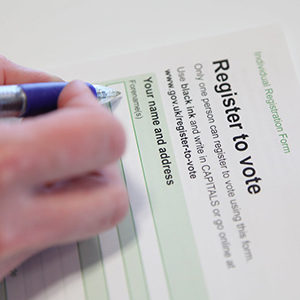Change Of Address Checklist

One thing too many people completely underestimate when moving house is how many different companies and organisations they’ll need to contact.
Unless you’ve gone through this before, you could find yourself in a moment of panic on the day of the move.
If you want to avoid scrambling and possibly missing a load of important organisations to contact, then use this change of address checklist to set up your own detailed plan.
There’s also a printable list at the bottom that you can print out to get you started.
Our 14 Point Checklist for Changing Addresses
1. Redirect Your Mail
The very first thing you should do is apply for postal forwarding with the Royal Mail. The way it works is that you fill out an online form and create a Royal Mail account.
Once this is set up, any post that would have been delivered to your old property will automatically be delivered to your new address.
There are two reasons for doing this.
Firstly, no matter how well prepared you are with making all the address changes, something might skip your mind. It could be an insurance or pension investment where you only receive mail once a year.
Secondly, it can sometimes take time for companies to update all their systems, meaning that something may already be labeled to be posted to your old property.
By setting up mail forwarding services [1], you can monitor who hasn’t got your new home address to contact them about the change.
2. Change Your Insurance Details
 A lot of your insurance will be very heavily dependent on your home address. The main reason for this is that your location may have an impact on your premium, and you don’t want to end up with a void policy.
A lot of your insurance will be very heavily dependent on your home address. The main reason for this is that your location may have an impact on your premium, and you don’t want to end up with a void policy.
However, policy for travel and health may not be reliant on your location for premium adjustments, but the companies need to know where to send policy updates, premium renewals, and possible claims information.
In most cases, such changes can be completed several weeks before your move, which may give you more time to pay any premium differences as well.
Here are the main ones to consider:
- House Insurance
- Health Insurance
- Life Insurance
- Travel Insurance
- Pet Insurance
3. Take Final Metre Readings
Before you vacate your old property, it’s important to take a final metre reading to ensure that your utility provider is able to send you a final bill for the old address.
It’s also a good idea to send the metre readings to the new owners or the landlord to ensure everyone has the latest and accurate information.
I would also suggest taking a reading in the new home and verify with the utility provider that they have the right information about when you started using the services.
Whether through dishonesty or a simple mistake, it could end up costing you money if you have to pay for a service you haven’t used.
4. Change Utilities
 One of the things that need to be a top priority when moving house is getting your utilities changed over. No matter what company supplies the services, you will need to call them with the most recent metre reading from step 3 above.
One of the things that need to be a top priority when moving house is getting your utilities changed over. No matter what company supplies the services, you will need to call them with the most recent metre reading from step 3 above.
I would suggest setting aside an hour on the day you’re moving just to go through the address and account change with each of the companies. Once you get on the phone with someone, it may not take that long, but sometimes you could be stuck in a holding queue.
These are the main utilities to contact:
- Electricity
- Gas
- Water
5. Update Work-Related Details
This is one of the things a lot of people completely forget. But you should always contact a few organisations related to your job about your new address.
Here are the main ones to consider:
- Employer
There are two reasons for your employer to have an accurate address. First of all, they may be sending out tax-related details to your home address. But it’s also important for payroll deductions that are reported to HMRC. - Revenue Services
All of your tax deductions are registered to the home you live in, so it’s important to let the Revenue Commissioner know of any changes [2]. This will also ensure that any correspondence and possible refund cheques make it to your new address. - National Insurance
There are many government and employment-related services that are dependent on your National Insurance number and details. Keeping these accurate at all times is important to ensure that the services you receive don’t get disrupted.
6. Contact Financial Institutions
 This is possibly one of the more time-consuming things on this checklist. Unless you have made it a point to do all your banking and other financial requirements with the one company, then you’ll possibly be making quite a few phone calls to update your new information.
This is possibly one of the more time-consuming things on this checklist. Unless you have made it a point to do all your banking and other financial requirements with the one company, then you’ll possibly be making quite a few phone calls to update your new information.
It’s worth checking out if some of the institutions might allow you to make information updates online. This could save you a considerable amount of time waiting in annoying phone queues.
I would suggest doing this a few days before your move when things are less hectic. Also, try to do this in batches of 2 or 3. That way, you can avoid too much frustration of listening to dreary music.
Here are some important things to start listing out:
- Current Accounts
- Debit Cards
- Credit Cards
- Pension Providers
- Loans
- Store Cards
7. Change Over Household Services
Here’s another not so fun list of services where you’ll need to contact each company individually about your new details. What you also need to keep in mind is whether you’re still tied into contracts for things like the Internet or Sky TV.
This could complicate things a little, but in most cases, you’ll be able to disconnect at the old address and reconnect at the new one.
However, we’ve heard of some Internet providers not covering all parts of the country, so you could end up out of pocket having to continue an existing contract.
Get started with this list:
- Satellite or Cable TV
- Landline Phone
- Internet
- Mobile Phone
- TV Licence
- Security Alarm
8. Update Car Related Details
 This is another section of address changes that you want to complete before you actually move to your new home.
This is another section of address changes that you want to complete before you actually move to your new home.
Car Insurance – This one is very important as your policy premium may go up or down depending on where you move to. Your provider will also need to know where to send renewal and other policy-related information.
DVLA – Make sure you contact the DVLA to update your driver’s license to the new details. You can do this online using the UK Government website [3].
Vehicle Log Book – While you’re updating your DVLA details, you can also do the same for your car’s logbook (V5C).
Breakdown Cover – Most breakdown cover providers offer something called home start assistance, which covers you if your car doesn’t start at your home. But they will also need to know where to send you details about your cover and annual invoices as well.
Millions of motorists run the risk of a fine up to £1,000 for having outdated details on their licences.
Emma Clarke, Journalist.
9. Update Your Memberships
This is something a lot of people tend to forget about, as it doesn’t seem like a high priority. However, you want to carefully consider what kind of subscriptions you have set up and contact each company to provide the new house address.
- Print Subscriptions – Take into account any kind of subscriptions to newspapers, magazines, and even professional publications you may need for work.
- Health Club Or Gym – These services sometimes send out special offers as well as invoices for payments.
- Sports Clubs – Whether you or your kids are members of different sports clubs, it’s always good for them to have up-to-date contact details for any kind of club updates that may be sent out.
10. Contact Educational Organisations
 Pretty much all educational organisations will need to know your current address. For your kids’ schools, it could be important for teachers to know that they may be going through a stressful couple of days or weeks.
Pretty much all educational organisations will need to know your current address. For your kids’ schools, it could be important for teachers to know that they may be going through a stressful couple of days or weeks.
But schools and universities may also regularly be sending out information and exam results. For universities and private tutors, there is also the need to be able to send out invoices for tuition fees, which you don’t want to miss.
- Schools
- Universities
- Tutoring
11. Let Your Medical Providers Know
Most people won’t actually receive much mail from their healthcare providers, but that doesn’t mean that they don’t require your new address. Medical records and tests may need to be submitted along with your address for verification purposes.
In some situations, you may also need to switch to new healthcare providers if you’re moving further distances. It can also help to let your previous dentist and doctors know who your new providers are going to be, to allow them access to your medical records.
- GP
- Optician
- Dentist
- Vet
12. Update Your Electoral Register
 This is quite likely the one thing that most people completely forget about. Because elections come around on a less regular basis, you may not be thinking ahead to the next election that could be a few years away.
This is quite likely the one thing that most people completely forget about. Because elections come around on a less regular basis, you may not be thinking ahead to the next election that could be a few years away.
However, if you don’t change your registered address on the electoral roll, then you would only be able to go and vote in the polling station at your old address.
Updating your address can be done online and only takes a couple of minutes [4]. It’s not the most urgent thing to do, but just add it to your list to complete if you have a few minutes to spare.
13. Inform The Local Authority
This is another one of the things you should do a few weeks before moving house. For some people, there may be payments coming from a local council, but your registered address with the council will also influence your property taxes.
Most councils may require you to visit their office to make these changes, but you are able to make updates to your property taxes online directly on the UK Government website [5].
Finally, if you’re in receipt of payments from the government, then you should also contact the Department of Work and Pensions [6].
14. Tell Friends And Family
 Now, unless you don’t want your friends and family to visit your new home, or you don’t want to keep getting birthday and Christmas cards, then take the time to get your address changes to them.
Now, unless you don’t want your friends and family to visit your new home, or you don’t want to keep getting birthday and Christmas cards, then take the time to get your address changes to them.
If you have WhatsApp or other social media groups, it can be quite easy to just send out one message to most people you know in one go. It could also be a good way to try and get some volunteers to help with some of the work involved in the move.
Print Out This Sheet
| Name | Account Number | Contact Details |
| 1 – Redirect Your Mail | ||
| Royal Mail | ||
| 2 – Change Your Insurance Details | ||
| House Insurance | ||
| Health Insurance | ||
| Life Insurance | ||
| Travel Insurance | ||
| Pet Insurance | ||
| 3 – Take Final Meter Readings | ||
| Electricity | ||
| Gas | ||
| Water | ||
| 4 – Change Utilities | ||
| Electricity | ||
| Gas | ||
| Water | ||
| 5 – Update Work Related Details | ||
| Employer | ||
| Revenue Services | ||
| National Insurance | ||
| 6 – Contact Financial Institutions | ||
| Bank 1 | ||
| Bank 2 | ||
| Credit Card 1 | ||
| Credit Card 2 | ||
| Pension | ||
| Loan 1 | ||
| Loan 2 | ||
| Store Card 1 | ||
| Store Card 2 | ||
| Store Card 3 | ||
| 7 – Change Over Household Services | ||
| Satellite or Cable TV | ||
| Landline Phone | ||
| Internet | ||
| Mobile Phone | ||
| TV Licence | ||
| 8 – Update Car Related Details | ||
| Car Insurance | ||
| DVLA | ||
| Breakdown Cover | ||
| Vehicle Log Book | ||
| 9 – Update Your Memberships | ||
| Print Subscriptions | ||
| Health Club Or Gym | ||
| Sports Clubs | ||
| 10 – Contact Educational Organisations | ||
| Schools | ||
| Universities | ||
| Tutoring | ||
| 11 – Let Your Medical Providers Know | ||
| GP | ||
| Optician | ||
| Dentist | ||
| Vet | ||
| 12 – Update Your Electoral Register | ||
| 13 – Inform The Local Authority | ||
| Old Council Office | ||
| New Council Office | ||
| 14 – Tell Friends And Family |
Final Tip: Make Sure You Set Aside A Few Hours
Moving home is not just about bubble wrapping your valuables and getting help to move some heavy items. To ensure that everything goes smoothly, once the move is complete, you have to take the time to update every company and organisation about the move.
While some of the above can be done online, it’s likely that you will need to phone the majority of them. This could mean a considerable amount of frustrating time in holding queues.
My advice would be to set aside 30 minutes a day for about a week to focus on this. It reduces frustration but still gives you enough time to get it all done. If you need more advice, please keep checking out Transport Executive for more tips about moving.
References:
- https://www.royalmail.com/personal/receiving-mail/redirection
- https://www.gov.uk/tell-hmrc-change-address
- https://www.gov.uk/tell-dvla-changed-address
- https://www.gov.uk/register-to-vote
- https://www.gov.uk/guidance/start-paying-council-tax
- https://www.gov.uk/report-benefits-change-circumstances

